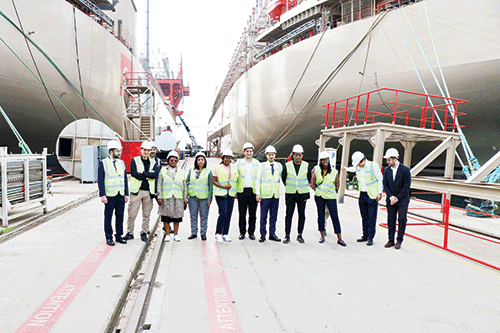George Sanzila
A Turkish company that develops power plants on ships says it could make Namibia become energy self-sufficient through its tested innovations.
Karpowership is a unique Turkish company that builds and operates power plants on ships, colloquially referred to as powerships.
Speaker of the National Assembly, Professor Peter Katjavivi recently met the company’s executive during his official visit to Turkey, where he held meetings with private companies and institutions of higher learning during at the invitation of his Turkish counterpart, Prof. Numan Kurtulmuş.
Katjavivi reiterated that partnerships between Namibian institutions and that of Turkey could be the panacea for some of the pressing challenges the country faces today.
According to the company’s Chief Commercial Officer, Zeynep Harezi Yilmaz, powerships are reliable and affordable and can dispatch clean and sustainable power from Liquified Natural Gas (LNG) of between 30 to 470 Mega Watts. She added that with the energy crisis plaguing the region, Namibia could become self-reliant.
“Namibia’s dependency will be minimized and it can become a net exporter of electricity. Namibia needs to increase its dispatchable generation capacity for self-sufficiency and to become an exporter of electricity due to the current load shedding in South Africa and the dire need for electricity in neighboring countries,” said Yilmaz.
Currently, Namibia imports over 60% of its energy needs from neighbouring countries, mainly South Africa. The peak demand for electricity in Namibia is over 600 MW per annum. Despite the success of the government’s rural electrification programme, only over 50% of Namibian citizens have access to power.
Yilmaz stated that the innovation was convenient and affordable as it required no acquisition or clearing of land nor construction thus averting unnecessary impending bureaucracy.
“Once the country has gotten into a partnership with us, we can deploy our ships in a matter of 1 to 3 months depending on site availability. There is no construction risk or any land requirement. Our assets are already built on the ship, therefore cutting any red tape. Our ships could be deployed to Walvis Bay or Oranjemund and create a number of jobs for locals and the country can export any access power. Our power is way cheaper than what is being sold on the market currently,” boasted Yilmaz.
She further stated that the company was fully aware of Namibia’s ambitious green hydrogen project meant to alleviate the energy crisis and the country’s plans to adopt renewable sources of energy and to de-carbonise. As a result, Karpowership believes it can offer a short-term solution to power shortages and could in a way contribute to renewable energy integration on the Namibian grid through its thermal power generation ships. According to the company, its technology has no environmental footprint after decommissioning.
It provided the latter information, after Tobie Aupindi, who is one of the members of parliament who accompanied Katjavivi on the visit, enquired as to whether it was harmful to the environment, particularly to marine life.
Kapowership is currently operational in 10 countries around the world with plans to supply power in countries such as Nigeria, the Democratic Republic of Congo and South Africa at an advanced stage.
The Speaker who further paid a visit to Sultanlar Holdings that specialises in manufacturing a variety of consumer products including detergents, personal care and food products expressed the need for a reciprocal arrangement between the two countries that can enable Turkish products to be easily available in Namibia and vice versa, including that country’s famous wool woven fabrics.
“I am looking at this broadly. If we can create sort of a centre where one can easily find all these products in Namibia and equally Namibian products in Turkey. Our relevant authorities need to create close collaboration so that we can boost trade between the two countries,” said Katjavivi.
Educational collaboration
During a meeting with the Council of Higher Education responsible for higher education institutions in Turkey, its president Erol Özvar revealed that only five Namibian students were sponsored at institutions of higher learning in that country through its scholarship for Foreign Students programme. He stated that he hoped the meeting could culminate in concrete cooperation between institutions of higher learning to increase the number of Namibian students. He further noted that the council was still waiting for feedback on a draft cooperation agreement it had shared with its Namibian counterpart since last year. He appealed to Katjavivi to intervene to expedite the process.
Katjavivi too was not happy with the low number of Namibian students studying at universities in Turkey adding that he would urgently engage the Ministry of Higher Education to ensure that more Namibians are enrolled. He noted that training and research were a necessity in Namibia in light of the discovery of new energy sources, which he said would require Namibians to be equipped with the necessary skills and knowledge to improve value addition.
*George Sanzila works for the National Assembly in the Division: Research, Information, Publications and Editorial Services*



